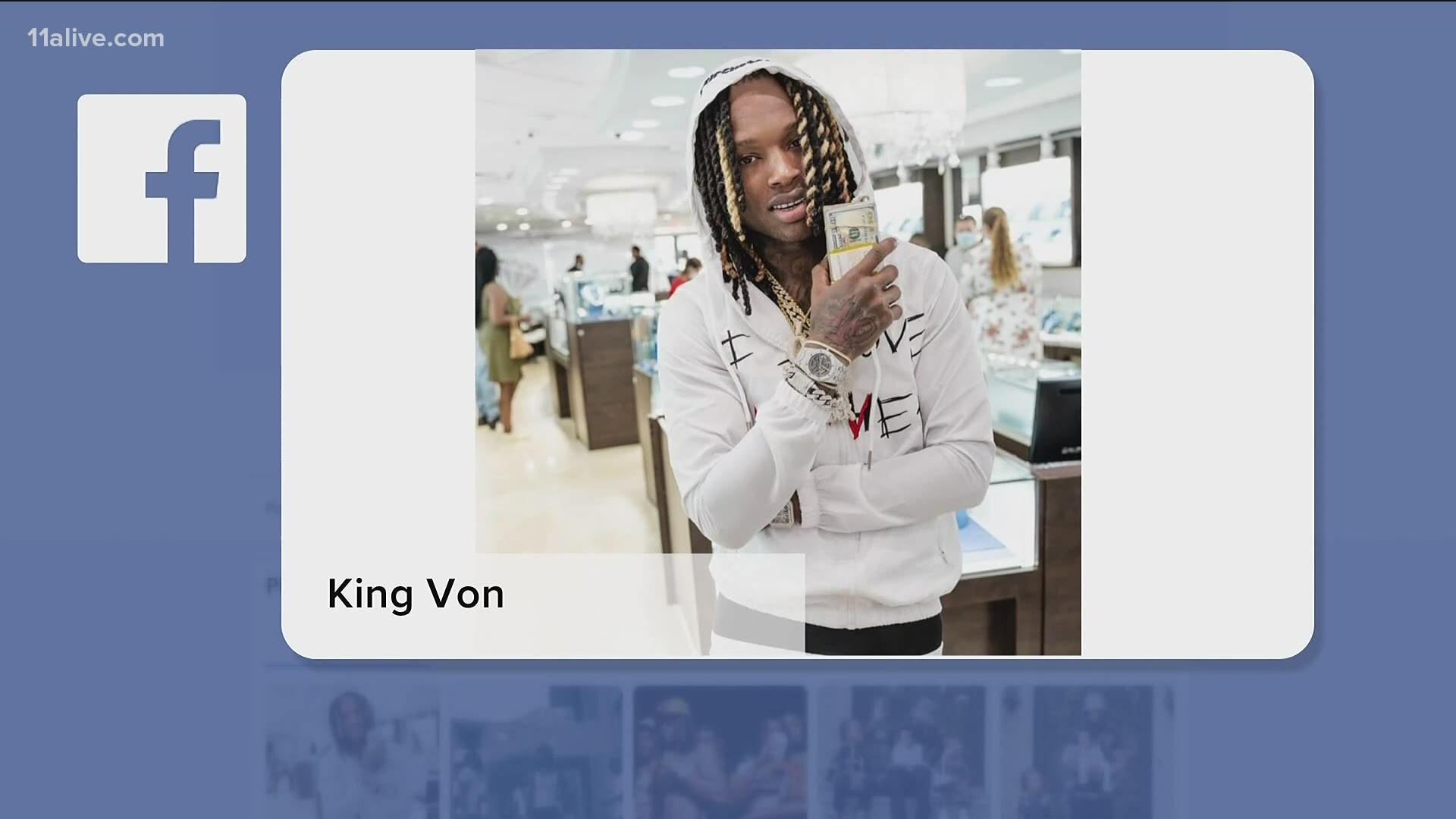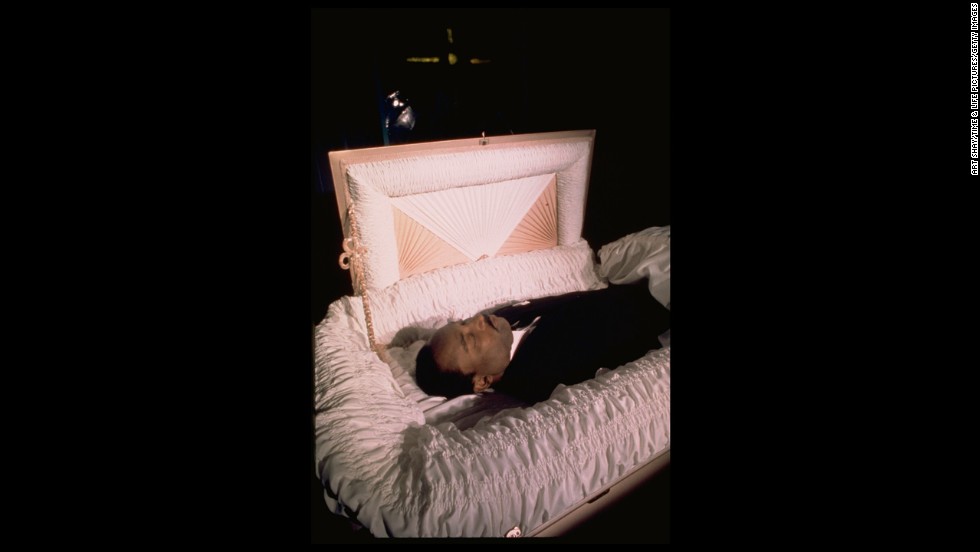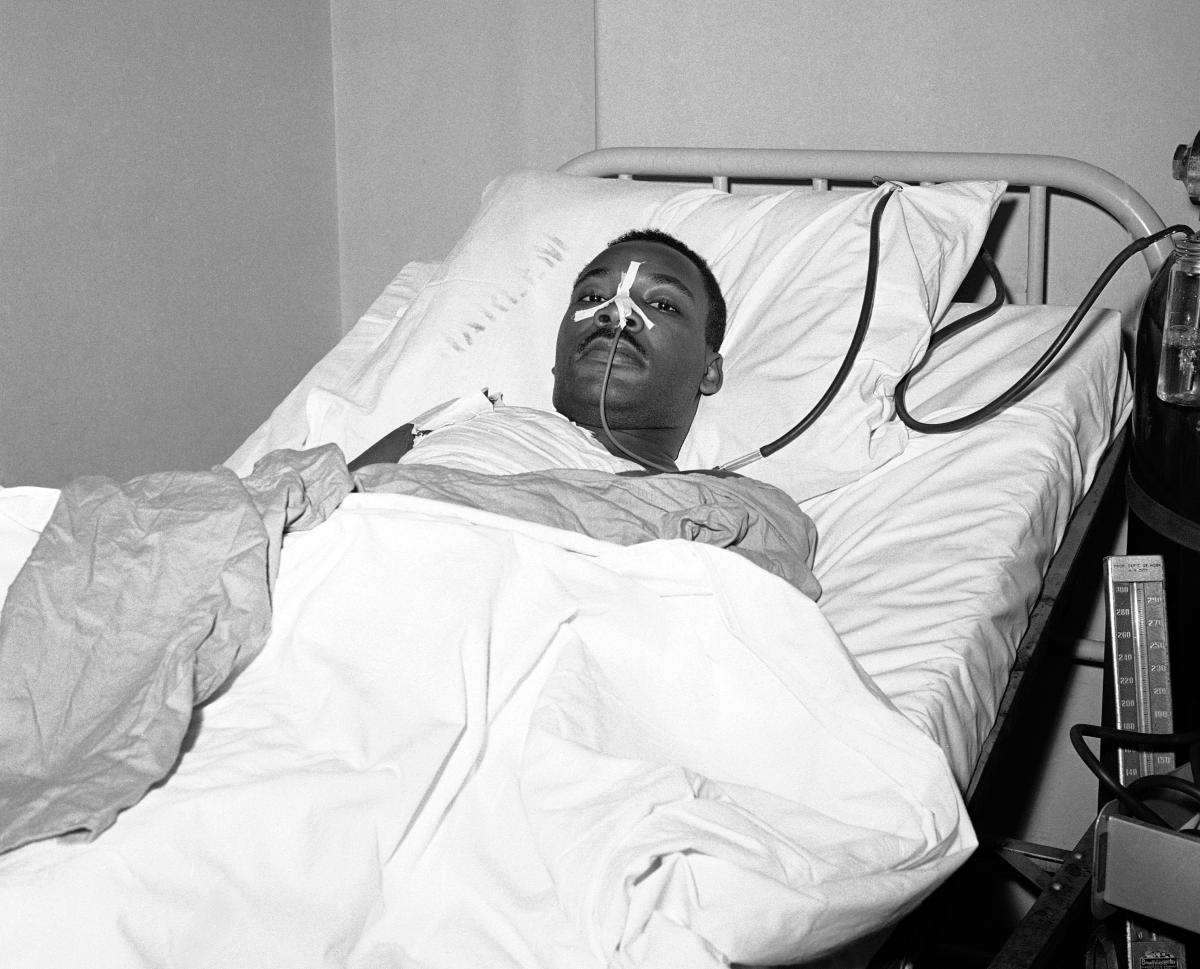King Von Autopsy Leak: Smiling Claims, Outrage & Aftermath
In the digital age, where personal boundaries blur with every click, is anything truly sacred anymore? The disturbing leak of King Von's autopsy photos is a stark reminder of how far we've strayed, shattering the sanctity of death and sparking a fierce debate about privacy, ethics, and the exploitation of tragedy.
The aftermath of King Von's death on November 6, 2020, outside an Atlanta nightclub, has been marred by controversy and outrage. The Chicago rapper, born Dayvon Daquan Bennett, was fatally shot during a confrontation between two groups. While the incident itself was tragic, the subsequent leak of his autopsy photos ignited a firestorm of anger and condemnation across social media. These images, purportedly showing Von on the autopsy table, surfaced online, quickly spreading and amplifying the grief of his fans and family. The Fulton County Medical Examiners Office in Atlanta, Georgia, conducted the autopsy, confirming that Von died from gunshot wounds sustained during the violent altercation, classifying his death as a homicide. The leak has prompted intense scrutiny of the protocols in place to protect sensitive information and sparked calls for accountability. The accessibility and rapid dissemination of these graphic images have underscored the urgent need for stricter regulations and a renewed commitment to respecting the dignity of the deceased, even in the age of digital media. The situation intensified when claims emerged that King Von appeared to be "smiling" in the leaked autopsy photos. This assertion quickly went viral, dominating online conversations, with many interpreting the supposed smile as a reflection of Von's character or a sign of peace. This interpretation, however, did little to quell the outrage surrounding the leak itself. Instead, it became another layer of complexity in a deeply disturbing situation. The fact that such a sensitive and private moment could be so callously exposed to the public has left many questioning the ethical boundaries of digital culture and the responsibilities of those entrusted with handling such information.
| King Von: Biographical and Professional Information | |
|---|---|
| Real Name | Dayvon Daquan Bennett |
| Stage Name | King Von |
| Date of Birth | August 9, 1994 |
| Place of Birth | Chicago, Illinois, USA |
| Date of Death | November 6, 2020 |
| Cause of Death | Gunshot wounds (Homicide) |
| Occupation | Rapper, Songwriter |
| Genre | Hip Hop, Drill |
| Years Active | 20182020 |
| Associated Acts | Lil Durk, OTF (Only The Family) |
| Record Label | Only The Family, Empire Distribution |
| Notable Albums | Grandson, Vol. 1, Levon James, Welcome to O'Block |
| Official Website | King Von Official Website |
King Von's sister, Kayla B, has been particularly vocal in her condemnation of the leak, demanding that the person responsible be held accountable. She has accused a mortician working for Atlanta Airport Mortuary Shipping Services of leaking the photos, suggesting that this individual may be attempting to protect their employer. Her outrage reflects the profound violation of privacy and the deep disrespect shown to her brother's memory. The call for the mortician's firing underscores the emotional pain and sense of injustice felt by Von's family. It also highlights the potential legal ramifications for those who mishandle sensitive information related to deceased individuals. The leak of the autopsy photos not only caused immense distress to King Von's family and fans but also raised significant ethical and legal questions about the handling of deceased individuals' remains and associated documentation. Privacy laws are designed to protect sensitive information, and the unauthorized release of autopsy photos constitutes a severe breach of these protections. This incident could lead to legal action against those responsible, including potential charges for violating privacy laws, mishandling confidential information, and causing emotional distress to the family of the deceased. Moreover, the actions of the alleged leaker have broader implications for the mortuary and medical examiner professions. Trust and confidentiality are paramount in these fields, and any breach of this trust can erode public confidence in the integrity of these institutions. The incident serves as a reminder of the importance of adhering to strict protocols and maintaining the highest ethical standards when handling sensitive information related to deceased individuals.
The dissemination of these images has prompted widespread debate about the ethics of sharing such content online. Many social media users have expressed disgust and disappointment, emphasizing the need to respect the deceased and their families. The incident has also highlighted the challenges of policing the internet and preventing the spread of harmful content. Despite efforts to remove the images, they continue to resurface on various platforms, underscoring the difficulty of controlling the flow of information in the digital age. The rapid spread of the King Von autopsy photos underscores the urgent need for social media platforms to strengthen their content moderation policies and develop more effective mechanisms for preventing the dissemination of harmful and disrespectful content. While platforms have policies in place to address content that violates community standards, the speed and scale at which these images spread highlight the limitations of current moderation efforts. Improved content moderation algorithms, coupled with increased human oversight, could help identify and remove such content more quickly. Furthermore, platforms could explore stricter penalties for users who share or promote such content, including temporary or permanent account suspensions. In addition to platform-level efforts, there is a need for greater public awareness about the ethical implications of sharing sensitive content online. Educational campaigns could help users understand the harm caused by such actions and encourage them to think twice before sharing or engaging with potentially offensive material. Ultimately, addressing the spread of harmful content online requires a multi-faceted approach that combines technological solutions with greater ethical awareness and individual responsibility.
The phrase "King Von autopsy" itself has become a loaded term, synonymous with the violation of privacy and the exploitation of tragedy. The very notion of his autopsy report, complete with photos and video, being circulated online is deeply disturbing. Fans, family, and concerned members of the public have vehemently opposed the sharing of such images, emphasizing the need for respect and dignity in death. This incident serves as a cautionary tale about the potential consequences of unchecked digital voyeurism and the erosion of personal boundaries. The focus on the details of the autopsy report, while potentially driven by curiosity or a desire for information, often overshadows the human element of the tragedy. King Von was not just a rapper; he was a son, a brother, and a friend. Reducing his life to a series of clinical details and graphic images is a profound disservice to his memory. The media's coverage of this incident also plays a crucial role in shaping public perception. Sensationalizing the details of the autopsy or focusing on the most graphic aspects of the leaked images can further exacerbate the harm caused to the family and fans. Responsible journalism requires a careful balancing of the public's right to know with the need to protect the privacy and dignity of the deceased. This includes avoiding the gratuitous use of graphic images and focusing on the broader ethical and legal implications of the incident.
King Von's rise to fame was marked by his raw talent and his ability to connect with audiences through his music. His tragic death cut short a promising career and left a void in the hip-hop community. The details surrounding his death are well-documented: a confrontation between two groups escalated into a violent shootout outside a nightclub in Atlanta, resulting in multiple injuries and fatalities. While the circumstances of his death are undoubtedly newsworthy, the leak of his autopsy photos goes far beyond the bounds of legitimate reporting. It represents a gross invasion of privacy and a blatant disregard for the family's grief. The emotional toll on King Von's family cannot be overstated. The unauthorized release of these images has compounded their pain and suffering, forcing them to relive the trauma of his death in a very public and intrusive way. The act of sharing these images online is not only disrespectful but also deeply dehumanizing, reducing King Von to a spectacle of death rather than celebrating his life and artistic contributions. The motivations behind the leak remain unclear, but regardless of the intent, the consequences have been devastating. Whether driven by malice, financial gain, or simply a lack of awareness, the person or persons responsible have caused irreparable harm to the family and fans of King Von. This incident serves as a stark reminder of the power of social media to amplify both positive and negative content, and the need for greater vigilance in protecting sensitive information and respecting the privacy of individuals, both living and deceased.
- Kannada Movies News Reviews Where To Watch Year Guide
- Movierulz 2025 Watch Telugu Tamil More Official Sites
The incident involving King Von's autopsy photos has sparked outrage not only among fans and family but also among celebrities and public figures who have condemned the violation of privacy and disrespect towards the deceased artist. Many have taken to social media to express their disgust and disappointment, calling for justice and accountability. Their voices amplify the message that such behavior is unacceptable and that those responsible must be held accountable for their actions. The support from celebrities and public figures can also help raise awareness about the broader issues at stake, including the need for stronger privacy protections and greater ethical considerations in the digital age. By speaking out against the leak, they can help shape public opinion and encourage social media platforms to take more proactive steps to prevent similar incidents from happening in the future. Furthermore, their involvement can provide a sense of solidarity and support to King Von's family, demonstrating that they are not alone in their grief and outrage. The collective condemnation of this incident sends a clear message that the exploitation of tragedy for personal gain or entertainment is unacceptable and that the privacy and dignity of the deceased must be respected. In the wake of this incident, there have been calls for greater regulation of the mortuary and medical examiner industries to prevent future leaks of sensitive information. Some have proposed stricter background checks for employees, as well as enhanced security measures to protect autopsy photos and other confidential documents. Others have suggested implementing harsher penalties for those who violate privacy laws, including potential criminal charges. The legal landscape surrounding the privacy of deceased individuals is complex and varies from state to state. However, most jurisdictions recognize that family members have certain rights regarding the handling of their loved one's remains and associated information. The unauthorized release of autopsy photos can constitute a violation of these rights, as well as a breach of contract or other legal obligations. In addition to legal remedies, there is also a need for greater ethical awareness within the mortuary and medical examiner professions. Training programs should emphasize the importance of maintaining confidentiality and respecting the dignity of the deceased. These programs should also address the potential consequences of violating privacy laws, both for individuals and for the reputation of the profession as a whole.
In the aftermath of King Von's death and the subsequent leak of his autopsy photos, the hip-hop community and the broader public have been left grappling with complex questions about privacy, ethics, and the responsibilities of those who handle sensitive information. The incident has served as a wake-up call, highlighting the need for greater vigilance in protecting the dignity of the deceased and preventing the exploitation of tragedy for personal gain. As the legal and ethical ramifications of this case continue to unfold, it is essential to remember the human element at the heart of this story. King Von was more than just a rapper; he was a son, a brother, and a friend. His memory deserves to be honored with respect and compassion, not defiled by the callous dissemination of graphic images. The "King Von autopsy" incident should serve as a catalyst for change, inspiring us to create a more ethical and responsible digital culture that values privacy, dignity, and respect for all individuals, both living and deceased. Only through such collective efforts can we hope to prevent similar tragedies from happening in the future.
The Atlanta Police Department was involved in the investigation of the shooting, and the Georgia Bureau of Investigation (GBI) may have also been involved in aspects of the investigation following King Vons death, given the complexities of the case and the number of individuals involved. The specifics of the autopsy report itself remain confidential, as they are part of an ongoing investigation and private medical records. Details regarding the number of gunshot wounds, the trajectory of the bullets, and any other findings would typically be included in the official report but are not publicly accessible. The focus remains on ensuring the privacy of the report and holding accountable those responsible for the leak. The leak has prompted a wave of emotional reactions from fans, fellow artists, and the broader community. Many have expressed their anger and disappointment at the lack of respect shown to King Von and his family. Social media platforms have faced criticism for their role in the spread of the images, prompting discussions about content moderation policies and the ethical responsibilities of online platforms in preventing the dissemination of sensitive and harmful content. Public discourse around the incident has also highlighted the broader issue of privacy rights and the need for stronger legal protections for individuals, even after death. This incident has become a focal point for conversations about digital ethics, media responsibility, and the importance of respecting the dignity of the deceased in the digital age.
The sharing of the King Von autopsy photos online is not only a violation of privacy but also potentially illegal, depending on the jurisdiction and the specific laws governing the handling of autopsy photos and medical records. Unauthorized distribution of such images could lead to civil or criminal penalties for those involved. In many jurisdictions, there are laws that protect the privacy of medical records, and autopsy photos are often considered part of those records. Sharing them without proper authorization from the family or legal authorities could result in legal action. The dissemination of the King Von autopsy photos has raised serious ethical questions about the responsibilities of individuals and institutions involved in handling sensitive information related to deceased persons. Medical examiners, morticians, and law enforcement personnel all have a duty to maintain confidentiality and respect the privacy of the deceased and their families. The leaking of these photos represents a breach of that duty and a violation of the trust placed in these professionals. Social media platforms also have an ethical responsibility to prevent the spread of harmful content, including autopsy photos and other graphic images. While these platforms may have policies in place to address such content, the rapid spread of the King Von autopsy photos suggests that these policies are not always effective. There is a need for greater vigilance and more proactive measures to prevent the dissemination of sensitive and potentially harmful material online.
The death of King Von and the subsequent leak of his autopsy photos are tragic events that have had a profound impact on his family, fans, and the broader community. The legal and ethical implications of this incident are significant, and it is important to ensure that those responsible are held accountable for their actions. Moving forward, it is essential to promote greater awareness of privacy rights and ethical responsibilities, and to strengthen legal protections for individuals, even after death. Only through such efforts can we hope to prevent similar incidents from happening in the future and ensure that the dignity of the deceased is respected. King Vons legacy as a talented artist and a member of his community should not be overshadowed by the disrespectful and harmful actions of those who leaked his autopsy photos. His memory should be honored with respect and compassion, and his family should be supported in their efforts to seek justice and accountability. It is up to all of us to work together to create a more ethical and responsible digital culture that values privacy, dignity, and respect for all individuals. In the midst of these unfortunate events, the narratives should be shifted towards celebrating his musical achievements. He was a prolific storyteller, painting vivid pictures of his life and experiences through his lyrics. His albums and mixtapes resonated with a large audience, and his contributions to the hip-hop genre should be remembered and celebrated. This focus on his artistic achievements will help to ensure that his legacy endures beyond the controversies surrounding his death.

King Von shot, killed Here's what we know about the case 11alive

To finish MLK's work, face up to racism (Opinion) CNN

'I've seen the Promised Land' How a brush with death shaped Martin